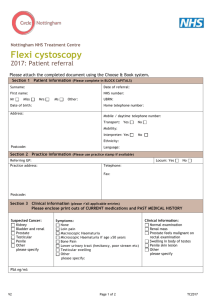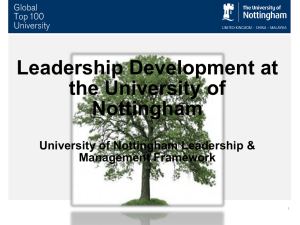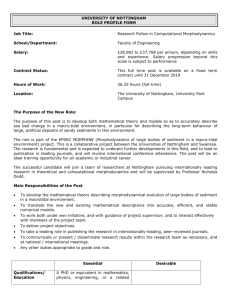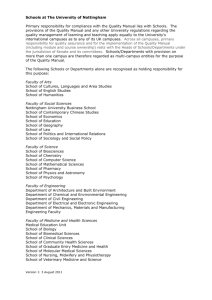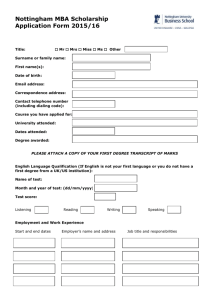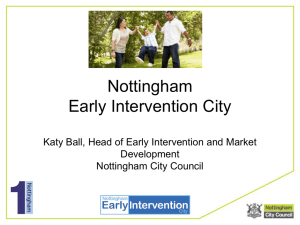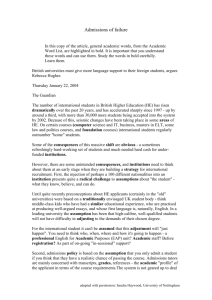Nottingham University - Jobs
advertisement
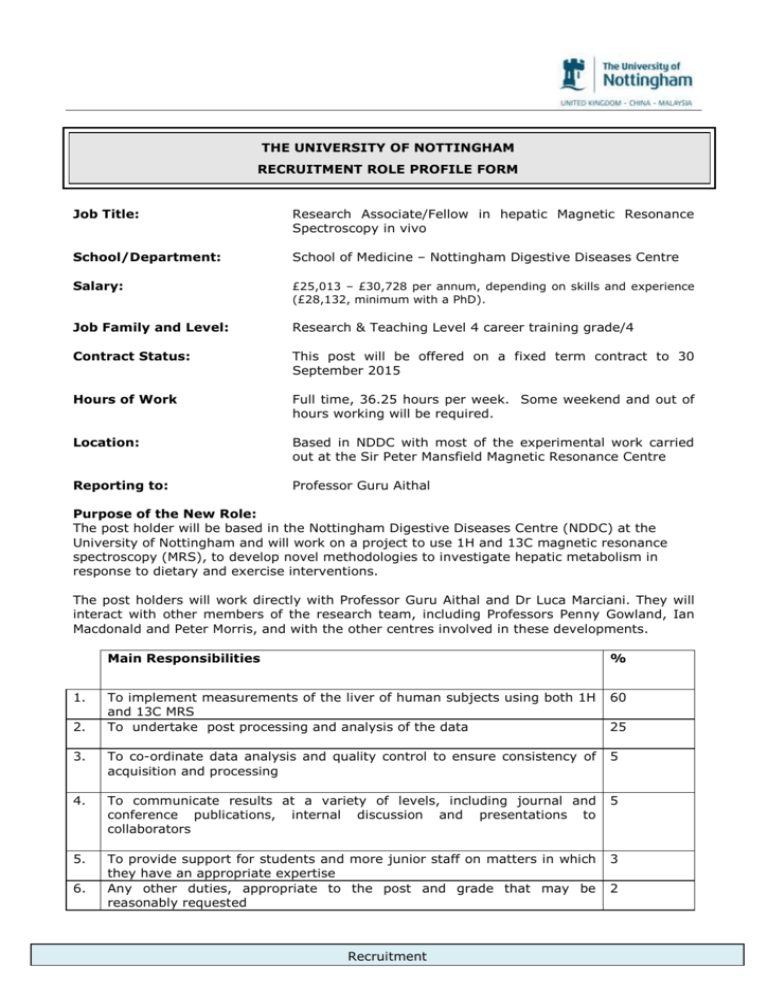
THE UNIVERSITY OF NOTTINGHAM RECRUITMENT ROLE PROFILE FORM Job Title: Research Associate/Fellow in hepatic Magnetic Resonance Spectroscopy in vivo School/Department: School of Medicine – Nottingham Digestive Diseases Centre Salary: £25,013 – £30,728 per annum, depending on skills and experience (£28,132, minimum with a PhD). Job Family and Level: Research & Teaching Level 4 career training grade/4 Contract Status: This post will be offered on a fixed term contract to 30 September 2015 Hours of Work Full time, 36.25 hours per week. Some weekend and out of hours working will be required. Location: Based in NDDC with most of the experimental work carried out at the Sir Peter Mansfield Magnetic Resonance Centre Reporting to: Professor Guru Aithal Purpose of the New Role: The post holder will be based in the Nottingham Digestive Diseases Centre (NDDC) at the University of Nottingham and will work on a project to use 1H and 13C magnetic resonance spectroscopy (MRS), to develop novel methodologies to investigate hepatic metabolism in response to dietary and exercise interventions. The post holders will work directly with Professor Guru Aithal and Dr Luca Marciani. They will interact with other members of the research team, including Professors Penny Gowland, Ian Macdonald and Peter Morris, and with the other centres involved in these developments. Main Responsibilities % To implement measurements of the liver of human subjects using both 1H and 13C MRS To undertake post processing and analysis of the data 60 3. To co-ordinate data analysis and quality control to ensure consistency of acquisition and processing 5 4. To communicate results at a variety of levels, including journal and conference publications, internal discussion and presentations to collaborators 5 5. To provide support for students and more junior staff on matters in which they have an appropriate expertise Any other duties, appropriate to the post and grade that may be reasonably requested 3 1. 2. 6. Recruitment 25 2 Knowledge, Skills, Qualifications & Experience Qualifications/ Education Skills/Training Experience Essential PhD in Physics (at least PhD thesis submitted for examination by the start of post) Experience of analyzing MRS data using academic software packages (eg jMRUI, Analyze 9) Knowledge of writing their own software for post processing and analysis (e.g. automated phase correction, line broadening and zero filling, peak fitting integrals). Strong background in multinuclear MRS particularly 13C MRS in human subjects Desirable Food Hygiene certificate Good Clinical Practice Certificate Experience with GlycoCEST Matlab Surface coil modelling MRS sequence simulation (e.g. bandwidth response of pulses) MR Scanner pulse programming (Philips scanner particularly) and implementation of multinuclear protocols Running human research trials to Good Clinical Practice standards Personal Attributes AMARES peak fitting using jMRUI Writing manuscripts for publication Cross-disciplinary research collaborations Obtaining Ethics approval for human studies Good communication skills and ability to work efficiently in a team Ability to show attention to detail Other Able to work in a laboratory based team and independently without close supervision following appropriate training. Ability to present work in oral and written format Informal enquiries may be addressed to Professor Guru Aithal, Email: (Guru.Aithal@nottingham.ac.uk) or Dr Luca Marciani, Email: (Luca.Marciani@nottingham.ac.uk). Please not applications sent directly to this post will not be accepted Page 2 of 5 Appendix 1 The University of Nottingham The University of Nottingham is a global-leading, research-intensive university with campuses in the UK, Malaysia and China. Our reputation for world-class research has yielded major scientific breakthroughs such as Nobel-winning MRI techniques, drug discovery, food technologies and engineering solutions for future economic, social and cultural progress. Already ranked among the UK’s elite universities and global polls for research excellence, our reputation for world-class research has been further enhanced with the 2008 results of the Research Assessment Exercise (RAE). In addition to scoring highly in quality rankings covering major disciplines in science, engineering, the social sciences, medicine, business and the arts, it is Nottingham’s increase in research power rankings which demonstrate the impressive volume of excellent research which is carried out. We are now ranked in the Top 7 of all British universities and are one of only two institutions to move into the UK Top 10 since 2001 – an increase of seven places, making us the highest mover of any university. Following the RAE results, 90% of all research at Nottingham has been classified of an ‘international standard’ and 60% as ‘world-leading’ or ‘internationally excellent’. The main University campus is set beside a lake, in an extensive belt of woodland, parks and playing fields. The 330 acre University Park Campus is the focus of life for more than 32,000 students and houses the majority of the University’s academic schools and many of the central Services. The Jubilee campus is situated 2 miles away from the University Park, and provides extra capacity. The University Medical School is situated next to the University Park. Together with the University Hospital, it forms the Queen’s Medical Centre (QMC). University of Nottingham Medical School Nottingham has a strong reputation for both clinical medicine and teaching. As one of the most popular medical schools in the country, it is able to select excellent students and produce and attract good junior doctors. The School of Medicine was formed following Faculty reconfiguration on August 1st 2013. The new School of Medicine comprises the Divisions of Cancer and Stem Cell Sciences, Child Health, Obstetrics and Gynaecology; Clinical Neuroscience; Epidemiology and Public Health; Primary Care; Psychiatry and Applied Psychology; Rehabilitation and Ageing; Medical Sciences and Graduate Entry Medicine; Respiratory Medicine; Rheumatology, Orthopaedics and Dermatology and the Nottingham Digestive Diseases Centre. The School also hosts the Medical Education Centre, the Centre for Interprofessional Education and Learning, the Clinical Research Facility, the Clinical Skills Centre, NIHR design Service East Midlands, Nottingham Clinical Trials Unit, PRIMIS and Medical Imaging Unit. The new School of Medicine brings together in one School staff undertaking research for the benefit of the health of patients. It includes all primary care and hospital-based medical and surgical disciplines, principally in the Queen’s Medical Centre and City Hospital Nottingham Campuses, Royal Derby Hospitals NHS Foundation Trust and also at the University’s main campus and at the King’s Meadow and Jubilee Campuses. Most of our School’s Senior Researchers and Teachers are also clinicians who dedicate 50% of their time to patient care within the Nottingham University Hospitals NHS Trust & Royal Derby Hospitals NHS Trust. This close juxtaposition brings cutting-edge clinical care to our patients and clinical relevance to our research and teaching. We are closely integrated with our full time NHS clinical colleagues, many of whom are themselves leaders in research and teaching and who work closely with the University and this increases the mutual benefit from integration between the University and NHS. Mission: Our mission is to improve human health and quality of life locally, nationally and internationally through outstanding education, research and patient care. Priorities: 1. Teaching and learning, particularly training tomorrow’s doctors and teaching specialised postgraduates Page 3 of 5 2. Research and research training: We will perform and support the highest quality “big” research which impacts on human health and disease 3. Partnership with the NHS and other healthcare providers 4. Visibility and profile of the School of Medicine: We will do what we do better, and we will tell others about it Ethos and principles: 1. Having people and patients at the heart of all we do: our teaching and learning, our research and our patient care 2. Contribution within the School of Medicine and to society beyond our immediate roles; helpfulness and service 3. Openness and fairness, with particular emphasis on communication (both internal and external) and on equality and diversity among students and staff 4. Personal and group responsibility for all aspects of our work, within a culture of opportunity and reward Our research spans 11 major themes, ranging from cancer to vascular medicine. We work closely with industry and the NHS. Our world-leading research ranges from basic and translational science through to clinical trials, epidemiology, and health services research. Our clear theme is improving human health, underpinning a vibrant postgraduate research training programme leading to PhD or DM. Many of our academics are clinicians, using their expertise to provide cutting edge specialised treatment to NHS patients; reflecting our ethos that patients are at the heart of all we do. Our major research themes are in Cancer and Stem Cells; Child Health, Obstetrics & Gynaecology; Clinical Neurosciences; Digestive Diseases; Epidemiology and Public Health; Mental Health; Musculoskeletal and Dermatology; Primary Care; Rehabilitation and Ageing; Respiratory Medicine and Vascular and Renal Medicine. The School of Medicine trains tomorrow’s doctors on a vibrant undergraduate medical course with a unique intercalated BMedSci, as well in a specialised graduate-entry programme built around clinical problem solving. We teach medicine and related disciplines at both undergraduate and postgraduate level. We have a dedicated clinical academic training programme and are committed to training PhD and doctoral research students and to supporting postdoctoral clinicians and scientists in their research. Professor John Atherton is Dean of the School of Medicine. For further information, please see our website http://www.nottingham.ac.uk/medicine Nottingham Central within the East Midlands, Nottingham is a vibrant and prosperous city with something to offer everyone. It is one of the UK’s leading retail centres and has a huge variety of restaurants, bars and nightclubs which attract people from all over the UK. Culturally, it has good theatres, an arena which attracts both national and international performers and a range of historical interests relating to subjects such as the lace industry, Lord Byron and DH Lawrence. Nottingham is also known for sport, being the home of Trent Bridge Cricket Ground, Nottingham Forest and Notts County Football Clubs, the National Water Sports Centre and the Nottingham Tennis Centre. There is a good network of roads with easy access to the M1 and the A1, a fast frequent rail service to London and other major cities. Nottingham East Midlands Airport is only eighteen miles away. The city is set within a county of outstanding natural beauty which includes Sherwood Forest, Wollaton Park, lively market towns and wonderful historic buildings. Housing is relatively inexpensive and, in addition to the two Universities, there are excellent schools and colleges available. To find out more about Nottingham, use the following links: Nottingham County Council – Tourism http://www.experiencenottinghamshire.com/ University of Nottingham http://www.nottingham.ac.uk Zoopla (Guide to local properties) http://www.zoopla.co.uk/ Page 4 of 5 My Nottingham (information on schools, term dates, school transport etc.) http://www.nottinghamcity.gov.uk/index.aspx?articleid=8524 Page 5 of 5
